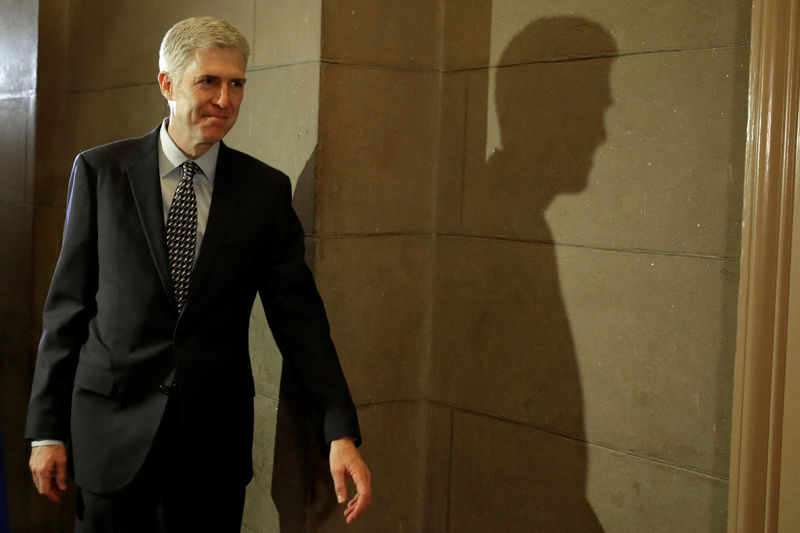By Andrew Chung and Lawrence Hurley
(Reuters) - When gay former law clerk Joshua Goodbaum married his partner in 2014, he got effusive and emotional reassurance from his former boss, President Donald Trump's conservative U.S. Supreme Court nominee Neil Gorsuch.
Goodbaum, now an attorney in Connecticut, recalled fondly their conversation on the week of the wedding: "He said, 'This is a wonderful thing. You'll see how your relationship grows.'"
Goodbaum, who in 2009 served as a clerk for the Colorado federal appeals court judge, added: "I have never felt the least whiff from him of homophobia or intolerance toward gay people."
As the U.S. Senate weighs whether to confirm the Republican president's nomination of Gorsuch for a lifetime seat on the nation's highest court, his views on social issues, such as gay rights, are under scrutiny by Democrats and Republicans alike.
The Supreme Court periodically makes landmark civil rights decisions such as the 2015 ruling legalizing gay marriage nationwide. In their current term, for instance, the justices will tackle a major transgender rights case.
For a year, the court has had eight justices, not the requisite nine, because Republicans refused to consider Democratic former President Barack Obama's nomination of Merrick Garland. Democrats remain furious with the Republicans for that, and are scouring Gorsuch's record to build their case against his Senate confirmation.
When he was named as a nominee by Trump on Tuesday, Gorsuch, 49, immediately came under attack from liberal groups that pounced on his social issues record, which is thin but offers clues on how he might behave as a justice, if confirmed.
Like Goodbaum, friends and acquaintances of Gorsuch, many of them Democrats, said he is genial, tolerant and respectful. In some ways, he differs in style from the justice he was named to replace, the late Antonin Scalia, who was known for being combative and blunt on the bench.
Gorsuch would not put politics before the law, these people said. But his conservative legal philosophy indicates he would likely vote with like-minded conservative justices on the closely divided court.
He rejects the idea that liberals can press their social agenda in the courts.
That could signaled he may be less likely to side with Justice Anthony Kennedy, a conservative who often casts the deciding vote in close cases.
Kennedy has joined with liberal justices in backing gay marriage, abortion rights and, most recently, a limited form of racial preferences in college admissions. It remains an open question whether Gorsuch would vote for conservative agenda items such as expanding religious liberties in a way some critics say allows for discrimination against gays and others, restricting voting rights and lifting campaign finance restrictions.
'ADDICTED TO THE COURTROOM'
In a 2005 article for conservative magazine National Review, Gorsuch said liberals "have become addicted to the courtroom, relying on judges and lawyers rather than elected leaders and the ballot box, as the primary means of effecting their social agenda on everything from gay marriage to assisted suicide to the use of vouchers for private-school education."
Some liberal politicians and advocacy groups have labeled Gorsuch a conservative hardliner in part over his role in deciding a 2013 case involving the Christian owners of the arts-and-crafts retailer Hobby Lobby. The ruling allowed owners of private companies to object on religious grounds to a federal requirement that they provide insurance to employees that pays for women's birth control. It was affirmed by the Supreme Court.
"We absolutely must not confirm a Supreme Court nominee who has ruled that the religious beliefs of employers can trump the law," said Rachel Tiven, chief executive of Lambda Legal, an advocacy group for the lesbian, gay, bisexual and transgender community.
On another issue, Gorsuch last October said his colleagues on the Denver-based 10th U.S. Circuit Court of Appeals should have reconsidered a ruling that prevented Utah Governor Gary Herbert from suspending funding to women's healthcare and abortion provider Planned Parenthood over videos purported to show its officials negotiating the sale of fetal tissue.
In 2006, Gorsuch wrote a book arguing against legalization of assisted suicide and euthanasia.
After Trump nominated him, many social conservatives and religious groups, perhaps looking back at his book, said they hoped Gorsuch would vote on the court to roll back abortion rights. In the book, Gorsuch cited the "inviolability of human life," calling it a "basic good."
The Knights of Columbus, a Roman Catholic fraternal organization, said Gorsuch would uphold religious freedoms "and the right to life of every person."
Former clerks said they do not know how Gorsuch, a member of the Episcopal church, would vote on gay marriage or abortion. But they said he never brought his religion into his work.
"He’s not the kind of person to use his post to push an agenda," said Jason Murray, a Gorsuch clerk in 2011 who is a Democrat.
"You could certainly say Judge Gorsuch is a conservative. But I don’t see how his personality or record bears out that he is an extremist," Murray said.
Some who know Gorsuch personally said his respect for legal precedent could prevent radical attempts to change the law.
"He's very sensitive to the importance of societal stability. So if he were to change Roe v. Wade significantly I would be surprised," added Tracy Ashmore, a Democratic lawyer from Denver, referring to the landmark 1973 Supreme Court ruling legalizing abortion.
